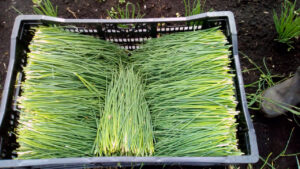Aromatic plants; They are cultivated as a condiment, medicinal plant and ornamental plant. Popular in both cooking and gardening, chives or chives are a favorite for those who are used to planting their own spices and medicinal plants. Some grow it for its mild onion flavor, others because of the attractiveness of its green leaves and pink-purple flowers, but the truth is that & nbsp; chives have earned a special place & nbsp; in the garden of many homes. Aromatic plants; They are grown as a condiment, medicinal plant and ornamental plant.
10 healthy benefits of chives
Considering all the nutrients and compounds that we find in this bulb, it is not surprising that its regular consumption has great health benefits. Chives are rich in flavonoid, antioxidant, and sulfuric compounds, which have been linked to the prevention and treatment of numerous conditions, including cancer, heart disease, and inflammatory processes in the body. Let’s see & nbsp; what scientific research says & nbsp; about these and other healthy benefits of chives.
Helps fight cancer
The antioxidant flavonoids present in chives, especially & nbsp; lutein & nbsp; and & nbsp; zeaxanthin , have been recognized for their protective action in cases of lung cancer and of mouth. Like other bulbs, chives contain & nbsp; allicin , a well-studied antioxidant for its preventive power against various types of cancer (prostate, esophageal). Furthermore, being rich in & nbsp; fiber , its regular consumption is believed to help prevent colon cancer.
As if that were not enough, eating chives helps us produce & nbsp; glutathione , the most powerful antioxidant agent that allows our body to identify and eliminate carcinogens.
Promotes good heart health
Allicin has also been shown to help balance cholesterol levels control hypertension by releasing nitric oxide into the bloodstream; This reduces the stiffness of the blood vessels and therefore the blood pressure levels.
Quercetin, another antioxidant present in chives, helps reduce plaque build-up in the arteries, while its abundant vitamin C content improves the elasticity of blood capillaries and the absorption of iron; Folic acid has also been shown to have an effect capable of suppressing blood vessel constriction 9. All these natural mechanisms make chives an excellent addition to our diet, especially for those with high cholesterol, high blood pressure, heart disease.
Supports good bone health
Chives contain vitamin K, an essential nutrient that helps maintain bone density and integrity. Consuming this bulb is also believed to be especially useful for people with rheumatoid arthritis due to its anti-inflammatory properties in the body, however further research on the subject is still required.
Improves the digestive process
Traditionally, chives have been recognized for their digestive benefits, especially to stimulate digestion and reduce flatulence. On the one hand, it is an excellent combination of fiber and essential nutrients such as niacin, thiamine, pantothenic acid, phosphorus and zinc, which promote good digestion of food. Likewise, chives have antibacterial properties that help eliminate fungi and harmful bacteria in the intestinal tract; for example, this bulb vegetable is said to be able to kill at least 30 strains of salmonella.
Helps detoxify the body
Due to both its antibacterial action and its chlorophyll and vitamin K content, chives are said to help us cleanse the blood, neutralizing a greater number of toxins in the body.
Stimulates the immune system
Chives contain numerous phytochemicals that help strengthen our natural defenses. Undoubtedly a good example of this is vitamin C, but minerals such as selenium also stand out, which although it is found in small amounts, has a very important impact on the functioning of the immune system. In addition, its sulfuric compounds have been shown to have a similar effect and that they can improve the body’s response to pathogens.
Helps improve vision
This benefit is due to the presence of the carotenes lutein and zeaxanthin, which are able to reduce oxidative stress in the eyes, stop the progression of cataracts and promote good eye health. Chives also contain quercetin, an antioxidant that appears to help preserve vision in patients with macular degeneration.
It is beneficial during pregnancy
Chives are a rich source of folate, an extremely important mineral during pregnancy. Folate is involved in fetal brain development, cell division, and DNA synthesis, helping to prevent birth defects (especially in the brain and spinal cord).
Can improve sleep and mood
There are different mechanisms through which the regular consumption of chives can improve our mood and sleep quality. For starters, this vegetable is a good source of choline, a nutrient that improves fat absorption, reduces chronic inflammation, helps maintain the structure of cell membranes, transmits nerve impulses, and has been shown to be effective for help us sleep well. Likewise, folic acid is recognized for causing an increase in the production of dopamine, serotonin and norepinephrine, hormones that stimulate good mood. In fact, the researchers say it is an ally against depression, since it prevents excess homocysteine in the body (having too much homocysteine can prevent blood and other nutrients from reaching the brain).
Improves the health of the skin and hair
Beta-carotenes, generally abundant in fruits, tubers, and vegetables, have been observed to improve the health and appearance of hair and skin. Chives are not far behind in this regard, which is why their regular consumption helps us to have brighter hair and rejuvenated skin. For its part, vitamin C, abundant in this vegetable, has strong antioxidant properties; It helps us reduce wrinkles, expression lines, blemishes and other signs of premature aging.
www.tuberculos.org
Tabla Nutricional
| Macronutrientes |
| Calorías: 30 |
| Grasas: 0.7 g |
| Carbohidratos: 4.4 g |
| Fibra: 2.5 g (10%) |
| Proteína: 3.3 g |
| Agua: 90.6 g |
| Vitaminas |
| Vitamina A: 131 IU (87%) |
| Vitamina C: 1.7 mg (97%) |
| Vitamina K: 213 mcg (266%) |
| Tiamina: 0.1 mg (5%) |
| Folatos: 105 mcg (26%) |
| Vitamina B6: 0.1 mg (7%) |
| Minerales |
| Calcio: 92 mg (9%) |
| Hierro: 1.6 mg (9%) |
| Magnesio: 42mg (10%) |
| Fósforo: 58 mg (6%) |
| Potasio: 296 mg (8%) |
| Zinc: 0.6 g (4%) |
| Cobre: 0.2 g (8%) |
| Manganeso: 0.4 g (19%) |












